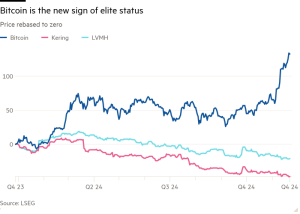Reeves struggles to escape from self-imposed restraints
Unlock the Editor’s Digest for free
Roula Khalaf, Editor of the FT, selects her favourite stories in this weekly newsletter.
The UK has a failing state. This is the argument of Sam Freedman’s excellent book, Failed State. Yet I am even more worried about its failing politics. Since politicians refuse to debate reality in general elections, outcomes are bound to disappoint.
The plight of Rachel Reeves, Labour’s chancellor of the exchequer, demonstrates this. She is bound by two sets of promises Labour should not have made. The first was to rule out increases in VAT, national insurance contributions and the main rates of income tax and corporation tax, even though these generate almost 75 per cent of tax revenues. The second was to bring the current budget, which excludes investment, into balance and for the Office for Budget Responsibility to forecast a declining ratio of net public debt to GDP in the fifth year of its forecast. This last rule she took from her predecessor, Jeremy Hunt. It is also “absurd”, notes Gus O’Donnell, former cabinet secretary.
The question, then, is whether and how Labour might deliver the improvements in the quality of public services voters want, while sticking at least to the letter of these foolish promises on taxes, deficits and debt. The Budget on October 30 will give Labour’s answer.
One possibility would be to predict big improvements in public sector productivity. But that would look highly implausible, for reasons Freedman lays out in detail.
A second possibility is to reconsider the definitions underlying fiscal rules. A possibility here is to remove the Bank of England’s losses from asset sales from the government’s accounts. Another is to include public sector assets in calculations of net debt. I have long argued that governments should take account of assets as well as liabilities when assessing their fiscal positions. Paying attention only to debt and not to the assets that debt may finance biases government against productive investment. It also leads them to underplay the possibility of using their assets more productively, as well as exaggerate the risks of unmanageable crises to a country able to borrow in its own currency.
At the very least, then, the government should shift its target to public sector net financial liabilities (PSNFL), which includes relatively illiquid financial assets, such as student debt. But it must also take public sector net worth (PSNW), which includes all assets, into account. Only then might governments stop the habit of slashing investment in crises, in the absurd belief that this is the best way to deliver a better future.
A third possibility is to think again on taxation. Despite the promises, there are things the government can do without making the tax system more of a mess than it is. Alas, the possibility that it will end up doing that is one of the reasons why those promises were unwise.
Crucially, what the government does should be set in the context of longer-term reform of the fiscal system. In the FT of August 6 2014, Nicholas (Lord) Stern, former head of the Government Economic Service, laid out what the principles of such a reform might be and how they might be implemented. The general principles, he set out, were to broaden the tax base and focus new taxes on “bads”. One should add the point that the system’s “progressivity” depends on the government’s overall tax and spending decisions, not on any of them in isolation.
One of Stern’s suggestions was to apply value added tax at the standard rate to a wider range of goods, including food and energy. This makes excellent sense, provided it is assessed in the wider context noted above. Another was to tax value added in finance, which is largely exempt from VAT. Alas, both ideas might be considered a violation of Labour’s promises. The other two are not. The government could, for example, replace fuel duty with the combination of nationwide congestion charges and carbon taxes. Moreover, as I have argued before, property taxes should be reformed and broadened. An immediate possibility, is to make council tax more progressive and update the valuations on which it is based from their antiquated 1991 base. This should be made part of broader changes in land taxes and local government finances.
So, there are options even within the restrictions the government has set for itself. Yet those were a big mistake. A smaller majority with a less restrictive set of promises would have been better for the country and the government.
Breaking its commitments would surely be a bad thing to do. But failure to improve the condition of the country could be even worse. The government must not preside over further years of failure. Timidity, then, is arguably the most dangerous strategy of all. Even if it means stretching her promises somewhat, Reeves has to dare to take risks.
Follow Martin Wolf with myFT and on Twitter
#Reeves #struggles #escape #selfimposed #restraints




